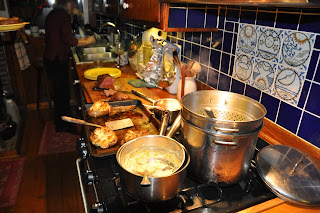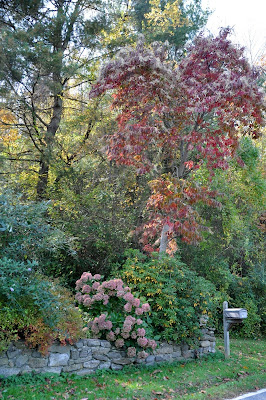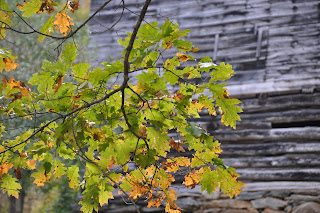Words and pictures from the author of And the Crows Took Their Eyes as well as the Elizabeth Goodweather Appalachian Mysteries . . .
Sunday, October 31, 2010
Saturday, October 30, 2010
Home Again, Home Again!
Lovely to be home again after several days on the road! I had a fine time and met some lovely people.
But, virtually speaking, I'm gone again. My post for today is over at Jenny Milchman's blog Suspense Your Disbelief -- where I ask the pressing question "Are we each awaiting the coming of a heavenly messenger, naming us The Grand Hooyah and Master of the Universe??
Jenny calls this post a "Made it Moment" and asked me when I knew I'd made it. To which I replied- but you can see what I said over there.
But, virtually speaking, I'm gone again. My post for today is over at Jenny Milchman's blog Suspense Your Disbelief -- where I ask the pressing question "Are we each awaiting the coming of a heavenly messenger, naming us The Grand Hooyah and Master of the Universe??
Jenny calls this post a "Made it Moment" and asked me when I knew I'd made it. To which I replied- but you can see what I said over there.
Friday, October 29, 2010
Were You Raised in a Barn? (Repost)
My older boy is able to answer that question affirmatively, if not entirely accurately. He did live with us in this barn for three summers -- the last summer stretching till the end of October.
The first summer was 1973. Our son was not quite one, not quite walking. We had just bought our farm and were camping out in the upper part of the barn, getting to know the place and our neighbors. The following summer my husband and a friend were building our house -- getting it to the 'dried in' stage before we had to return to our teaching jobs in Florida. And the third summer, we were back with all our belongings and various helpful friends and family, making the big push to finish the house before cold weather.
 Unfortunately, it began to get cold toward the end of October and when we awoke one morniong to find snow on our sleeping bags, we moved into the unfinished house where we at least had a wood stove. What bliss!
Unfortunately, it began to get cold toward the end of October and when we awoke one morniong to find snow on our sleeping bags, we moved into the unfinished house where we at least had a wood stove. What bliss!
It was a wonderful experience though, living like in the barn -- cooking on a Coleman stove, bathing in the branch or in a washtub, the big entertainment at night watching the lightning bugs. When we moved to the house we actually said that we should move back to the barn every summer -- but of course we didn't.
I made use of the experience in Old Wounds -- the barn that Elizabeth's family is living in is based on our barn and that dark rectangle there on the front is a shutter which, when pushed up is the window Rosie sat at to watch Miss Birdie and Cletus come up the road.
And my older son has an excuse for all time for any less than polite behavior he may commit.
The first summer was 1973. Our son was not quite one, not quite walking. We had just bought our farm and were camping out in the upper part of the barn, getting to know the place and our neighbors. The following summer my husband and a friend were building our house -- getting it to the 'dried in' stage before we had to return to our teaching jobs in Florida. And the third summer, we were back with all our belongings and various helpful friends and family, making the big push to finish the house before cold weather.
 Unfortunately, it began to get cold toward the end of October and when we awoke one morniong to find snow on our sleeping bags, we moved into the unfinished house where we at least had a wood stove. What bliss!
Unfortunately, it began to get cold toward the end of October and when we awoke one morniong to find snow on our sleeping bags, we moved into the unfinished house where we at least had a wood stove. What bliss!It was a wonderful experience though, living like in the barn -- cooking on a Coleman stove, bathing in the branch or in a washtub, the big entertainment at night watching the lightning bugs. When we moved to the house we actually said that we should move back to the barn every summer -- but of course we didn't.
I made use of the experience in Old Wounds -- the barn that Elizabeth's family is living in is based on our barn and that dark rectangle there on the front is a shutter which, when pushed up is the window Rosie sat at to watch Miss Birdie and Cletus come up the road.
And my older son has an excuse for all time for any less than polite behavior he may commit.
Thursday, October 28, 2010
Old Tobacco Barns (repost)
The old tobacco barns that dot the landscape in our county sometimes puzzle uninformed visitors who remember snug red New England barns or massive white-boarded Midwestern structures. The visitors laugh and shake their heads and go back home to tell their friends about the ignorant hillbillies of Appalachia -- too shiftless to make a barn that'll keep the weather out. Sometimes they assume that once there was chinking between the logs and the present generation hasn't bothered to repair it. But they're wrong on both counts.
These beautiful old silvery-gray buildings were meant to let the air in -- built specifically to air-cure burley tobacco, at one time the major crop in our county. Inside the barns, stout tier poles stretch from end to end, four or five or more tiers high. When the tobacco was harvested, the stalks of the whole tobacco plants would be impaled on tobacco sticks -- five plants per stick. Then these sticks would be hung from the tier poles, rank after rank of wilting yellow-green leaves till the barn was full. From September till November the leaves would cure in the mountain air, their tarnished chartreuse hue giving way eventually to a rich golden brown that said the leaves were ready to be stripped from the stalks, sorted and graded, and taken to market.
Proud old barns, built right for the job they did.
These beautiful old silvery-gray buildings were meant to let the air in -- built specifically to air-cure burley tobacco, at one time the major crop in our county. Inside the barns, stout tier poles stretch from end to end, four or five or more tiers high. When the tobacco was harvested, the stalks of the whole tobacco plants would be impaled on tobacco sticks -- five plants per stick. Then these sticks would be hung from the tier poles, rank after rank of wilting yellow-green leaves till the barn was full. From September till November the leaves would cure in the mountain air, their tarnished chartreuse hue giving way eventually to a rich golden brown that said the leaves were ready to be stripped from the stalks, sorted and graded, and taken to market.
Proud old barns, built right for the job they did.
Wednesday, October 27, 2010
On the Road Again, Again
Leaving today for the middle of the state -- I'll be speaking at the Cary public library tonight at 6, then staying with the always delightful Molly Weston in Apex.
On Thursday, I'll head for Greeneville, SC to speak to the Upstate Chapter of Sisters in Crime. On Friday I'll make my way back home. . .
So I likely won't be blog visiting or answering comments . . . but I will re-post some older posts and be back for real (what is real?) on Saturday!
On Thursday, I'll head for Greeneville, SC to speak to the Upstate Chapter of Sisters in Crime. On Friday I'll make my way back home. . .
So I likely won't be blog visiting or answering comments . . . but I will re-post some older posts and be back for real (what is real?) on Saturday!
Tuesday, October 26, 2010
FAQ- Milk It!
Q: You're always talking about how much you've learned from your editor -- can you give us an example?
A: Oh, yes! One of my favorites is 'Milk it!' (This week's assignment in my writing class, as a matter of fact.)
I first saw this comment on the edit of Signs in the Blood. My protagonist Elizabeth was in a scary situation and needed to stop her car and get out. So that's what she did -- in about two sentences.
In the margin, Herself penciled "Milk it!" meaning that I should wring every last ounce of tension possible from the scene. So there were sweaty palms and fumbling with seatbelt latch, yadda, yadda, till the escape had been effected -- maybe two pages later.
In the margin, Herself penciled "Milk it!" meaning that I should wring every last ounce of tension possible from the scene. So there were sweaty palms and fumbling with seatbelt latch, yadda, yadda, till the escape had been effected -- maybe two pages later.
Here's a hypothetical example of a moment of high tensions being prolonged. Suppose you have a character who is running away from someone, don't just write "She ran along the road and flagged down a passing car with friendly people who who gave her a ride home."
Too short for tension to build - it's over before it's begun.
Instead, in this scene, the character should run, slip and fall, get up, run some more -- always aware to the footsteps growing ever closer. She should try to flag down a car only to have it zoom past her; she should keep running, slowing because of being out of breath or a stone in her shoe or something.
All the time, the pursuer is getting closer. Maybe she passes a house and sees someone in the front yard but when she calls to them, that person scurries inside and slams the door shut. And the pursuer is getting ever closer.
This could go on for quite a bit (I'm sure you could think of more stumbling blocks in her path) before the friendly car comes along. When it does, it could slow and she would think she was saved.
Too short for tension to build - it's over before it's begun.
Instead, in this scene, the character should run, slip and fall, get up, run some more -- always aware to the footsteps growing ever closer. She should try to flag down a car only to have it zoom past her; she should keep running, slowing because of being out of breath or a stone in her shoe or something.
All the time, the pursuer is getting closer. Maybe she passes a house and sees someone in the front yard but when she calls to them, that person scurries inside and slams the door shut. And the pursuer is getting ever closer.
This could go on for quite a bit (I'm sure you could think of more stumbling blocks in her path) before the friendly car comes along. When it does, it could slow and she would think she was saved.
Then it could speed back up and go on. And she would despair. Then at last, she could see its brake lights go on and it would back up and the driver would ask if she wanted a ride.
That's milking it!
Monday, October 25, 2010
Sunday, October 24, 2010
All Day Birthday
From early morning with Eggs Benedict and Mimosas . . . to evening moonrise with Filet Mignon with Red Wine sauce, stuffed potatoes, broccoli with Bernaise . . .
And probably the most decadent cake around -- four chocolate layers with raspberry jam between the layers and chocolate frosting and whipped cream on the outside --
we celebrated John's birthday yesterday!
Maybe just a little tea and plain toast today . . .
Saturday, October 23, 2010
Autumn Reds and Golds
Down the branch, a neighbor's sourwood tree is in full glory. Pale sourwood honey is thought by many to be the best honey of all
A sunny day-- golds dazzle the eye as light breezes make the trees shimmer and sparkle.Just like in San Francisco, I'm always looking up. The buildings are a little different though ...

For red and gold, just look at this confused forsythia -- bright yellow spring blossoms and deep red autumn leaves!
Catch the sun behind the leaves and you have Nature's stained glass.
ryThe slide show pictures were taken yesterday in Asheville at the Botanical Gardens and at the Beaver Lake Bird Sanctuary. Click on pictures to biggify.
Friday, October 22, 2010
Me and Steig and Harper Lee and Some Other Guys
From the Southern Independent Booksellers bestsellers list for the week of October 10 http://www.authorsroundthesouth.com/bestsellers
1. The Girl With the Dragon Tattoo
Stieg Larsson, Vintage, $7.99, 9780307473479
2. 61 Hours
Lee Child, Dell, $9.99, 9780440243694
3. The Girl Who Played With Fire
Stieg Larsson, Vintage, $7.99, 9780307476159
4. To Kill a Mockingbird
Harper Lee, Warner, $7.99, 9780446310789
5. Play Dead
Harlan Coben, Signet, $9.99, 9780451231741
6. Animal Farm
George Orwell, Signet, $9.99, 9780451526342
7. The Day of Small Things
Vicki Lane, Dell, $7.99, 9780385342636
8. I, Alex Cross
James Patterson, Vision, $9.99, 9780446561969
9. Pursuit of Honor
Vince Flynn, Pocket, $9.99, 9781416595175
10. Pirate Latitudes
Michael Crichton, Harper, $9.99, 9780061929380
 l
lSo, I thought that was pretty cool! And it's thanks to all of you who patronize your local Indie booksellers. (I know -- it's just not possible for some of you who don't have a local Indie bookseller.)
The independent booksellers have been my greatest friends. These are the folks who know their books and know their customers and delight in match-making. If they are enthusiastic about a book, they will hand sell it, singing its praises to the folks most likely to enjoy it.
I'm heading in this afternoon to one of my favorite indies -- Accent on Books on Merrimon Avenue in Asheville. I'll chat with folks and read a bit from The Day of Small Things and maybe tell about how Byron, one of the friendly booksellers there (and a hereditary Appalachian witch as well!) helped me with my research.
And I'll be thanking them, as I'm thanking all of you, for the ongoing support!
(By the way -- if you ever find yourself craving a signed and personalized copy of any of my books for yourself or for gift-giving, Accent on Books is the place to call. I'm in the area about once a week and it's easy to stop by and personalize a copy ...)
(By the way -- if you ever find yourself craving a signed and personalized copy of any of my books for yourself or for gift-giving, Accent on Books is the place to call. I'm in the area about once a week and it's easy to stop by and personalize a copy ...)
Thursday, October 21, 2010
Misty Autumn
Yesterday dawned damp and misty -- a change from the bright days we'd been having. But moisture is always welcome, especially in the fall when the danger of forest fires is greatest.
Days like this set me to thinking of The Hobbit for some reason -- of tramps through misty woods with the heavenly smell of the damp earth and the fallen leaves underfoot, and a return to a cozy fire and a mug of tea with the aroma of frying bacon and mushrooms in the air.
Wednesday, October 20, 2010
FAQ - Stereotypes?

Q:Many readers come to your books with preconceived notions of what life/people are like in the south. Do you feel you have to spend more time with character development to move away from these stereotypes, especially those held about Appalachia? Or do you feel you must include characters that meet these stereotypes, such as Cletus and Miss Birdie or the snake-handlers?
A: First of all, I think most stereotypes exist because there really are people like that. My job as a writer is to make sure that I am faithful to all of the people and places I'm depicting and that I help the reader to see the person beyond the stereotype.
A: First of all, I think most stereotypes exist because there really are people like that. My job as a writer is to make sure that I am faithful to all of the people and places I'm depicting and that I help the reader to see the person beyond the stereotype.
I include characters like Cletus because there are people like Cletus (and people named Cletus, and Odus and Philetus and Plato and his daughter Treasure and would you believe I've known two people named Cleophas?) Birdie, as I've mentioned before, is an amalgam of many women I've known here in the mountains (the Birdie of the first four books, anyway -- the Birdie in The Day of Small Things has some things going on that are the products of my imagination.)
In the course of my books, I'm trying to make it clear that there are all sorts of folks in Appalachia and very few meet the stereotype of the lazy, illiterate, ignorant, moonshine-stillin' mountaineer. Cletus, for example, may be "simple" but he's a hard worker and a genius in the woods.
But here's the insidious thing: In writing minor characters, stereotypes are an easy shortcut for the writer and offer a comforting familiarity to the reader. Sweet little old lady . . . corrupt politician . . . bigoted bully of a small town sheriff . . . effeminate homosexual . . . sulky teen . . . dumb blonde . . . the list is endless. Just say that small town sheriff has a belly hanging over his gunbelt and has piggy eyes behind his mirrored sunglasses and we all have an idea of who he is. But he's basically a stereotype.
The fun thing is to play with the stereotypes by giving that character an unexpected trait. Maybe this sheriff stops to take a box turtle out of the road and put it safely in the grass at the side of the road. Maybe he hums arias from grand opera. Maybe, in the dead of night, he leaves a bag of groceries for a poor black family. Now that sheriff is no longer a stereotype.
But here's the insidious thing: In writing minor characters, stereotypes are an easy shortcut for the writer and offer a comforting familiarity to the reader. Sweet little old lady . . . corrupt politician . . . bigoted bully of a small town sheriff . . . effeminate homosexual . . . sulky teen . . . dumb blonde . . . the list is endless. Just say that small town sheriff has a belly hanging over his gunbelt and has piggy eyes behind his mirrored sunglasses and we all have an idea of who he is. But he's basically a stereotype.
The fun thing is to play with the stereotypes by giving that character an unexpected trait. Maybe this sheriff stops to take a box turtle out of the road and put it safely in the grass at the side of the road. Maybe he hums arias from grand opera. Maybe, in the dead of night, he leaves a bag of groceries for a poor black family. Now that sheriff is no longer a stereotype.
I do try to develop even minor characters beyond stereotypes -- and the bigger a part the character plays in the book, the more I try to show various sides of their personality. Look what happened to Birdie when she had a book all to herself! There was a lot more to her than meets the eye. I suspect that the same could be true for any of my so-called minor characters.
Stories waiting to be told . . .
Tuesday, October 19, 2010
Time to Dig the Taters...
I was on the phone with my agent, telling her about San Francisco and my meeting with Herself. But then I had to cut the conversation short because it was time to dig the potatoes.
Nothing like farm chores to keep one grounded -- John ran the tractor, busting out the taters, Justin and Claui picked them up, and I sorted -- Big, Medium, Small, and Cut or otherwise damaged and needing to be used soon.
Nothing like farm chores to keep one grounded -- John ran the tractor, busting out the taters, Justin and Claui picked them up, and I sorted -- Big, Medium, Small, and Cut or otherwise damaged and needing to be used soon.
As always, there were a few oddities -- the ducky, the snowman, some unnameable things and, my personal favorite, the goldfish.
I haven't had time to go blog visiting -- trying to get unpacked and organized after my trip but I'll be around to say hi soon. Just now I'm fading fast after a long day...
Here's a little slide show from Monday -- so nice to be back where I belong -- milking, the growing chickens, and the latest addition to the mix -- Ruby, the horse who came with our new tenants, Nancy and Suzy.
Subscribe to:
Posts (Atom)







































